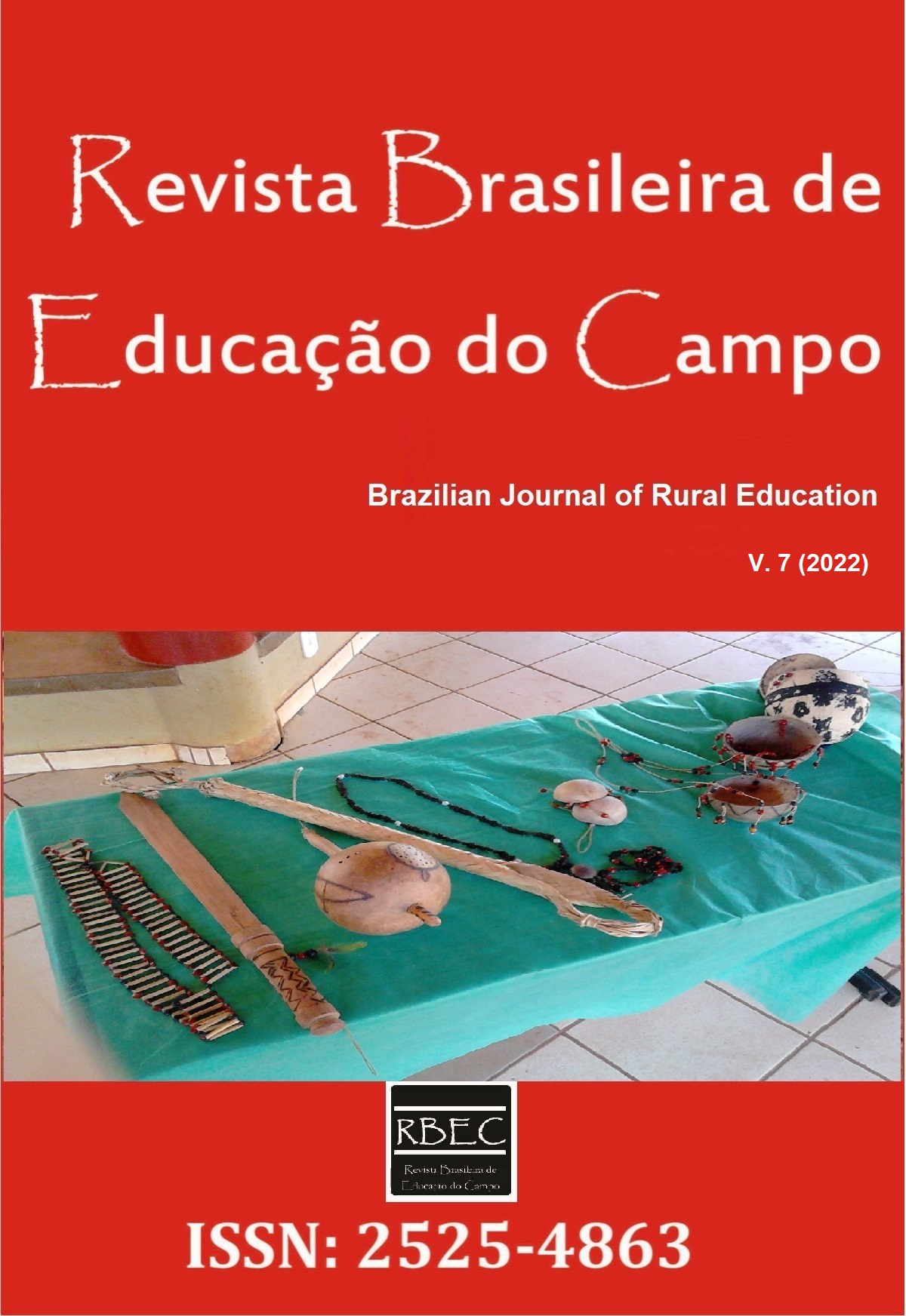The rural school’s curriculum and its connections with the principles of Countryside Education
DOI :
https://doi.org/10.20873/uft.rbec.e11140Résumé
ABSTRACT. This article presents the result of a Master's in Education research on the movement of building the curriculum of the Rural Capoeira dos Dinos school, in the municipality of Piraquara/PR from the protagonism of the school's teachers. It seeks to examine how this school and the educators, in their pedagogical work, approach the principles of Countryside Education and how these principles shape the school curriculum. For this purpose, qualitative research was used, which articulated the participation and listening of the rural schoolteachers. The documentary analysis of three curricular proposals and the oral history methodology were adopted as instruments for data collection. Contributions from Arroyo (2007, 2010, 2015); Freire (2002); Schwendler (2010, 2017); Souza (2008, 2016); Sacristán (2000, 2011); Beirnstein (1996); Caldart (2010, 2012) were essential for the debate on the prescribed and recontextualized curriculum and the Countryside Education. The data indicate that the school’s curriculum proposal does not differ from the prescribed curriculum of the municipal network. However, the curriculum in action reveals attempts to prioritize content and strategies that address the specificities of the rural community, in teaching work, based on the process of curricular recontextualization. The results show the possibilities of reinterpreting and reworking the curriculum text, based on the paradigm of Countryside Education, concluding that the participation of teachers and the rural community is fundamental in the construction of the curriculum. The school in the countryside is advocated as a space for reconstruction, dialogue, and transformation, generating the construction of a curriculum that reflects the needs of the communities.
Téléchargements
Références
Arroyo, M. G. (2007). Políticas de formação de educadores do campo. Cad. Cedes, 27(72), 157-176. https://doi.org/10.1590/S0101-32622007000200004
Arroyo, M. G. (2012). Currículo, território em disputa. Petrópolis, RJ: Vozes.
Arroyo, M. G. (2015). Os Movimentos Sociais e a construção de outros currículos. Educar em Revista, 55, 47-68. https://doi.org/10.1590/0104-4060.39832
Berstein, B. (1996). Classes, códigos e controle. A estruturação do discurso pedagógico. Petrópolis, RJ: Vozes.
Caldart, R. S. (2010). A educação do campo em movimento. In Arroyo, M. G., Caldart, R. S., & Molina, M. C. (Orgs.). Por uma educação do campo (pp. 87-133). Petrópolis, RJ: Vozes.
Caldart, R. S. (2012). Educação do Campo. In Caldart, R. S., Pereira, I. B., Alentejano, P., & Frigotto, G. (Orgs.). Dicionário da Educação do Campo (pp. 259-267). Rio de Janeiro, São Paulo: EPSJV, Expressão Popular.
Costa, B. B. (2016). Paulo Freire: educador-pensador da libertação. Pro-Posições, 27(79), 93-110. https://doi.org/10.1590/0103-7307201607906
Freire, P. (2002). Pedagogia da autonomia. São Paulo, SP: Cortez.
Fernandes, B. M. (2002). Diretrizes de uma caminhada. In Kolling, E. J., Cerioli, P. R., & Caldart, R. S. (Orgs.). Por uma Educação do Campo (pp. 89-109). Brasília, GO: MDA/MEC.
Fernandes, B. M. (2004). O campo da Educação do Campo. In Molina, M. C., & Jesus, M. S. (Orgs.). Por Uma Educação do Campo: Contribuições para a Construção de um Projeto de Educação do campo (pp. 32-53). Brasília, GO: MDA.
Molina, M. C. (Org). (1999). Por uma educação básica do campo. Brasília, GO: Peres.
Molina, M. C. (2010). Reflexões sobre o significado do protagonismo dos Movimentos Sociais na construção de Políticas Públicas de Educação do Campo. In Arroyo, M. G., Caldart, R. S., & Molina, M. C. (Orgs.). Por uma educação do campo (pp. s./p.). Brasília, GO: MDA/MEC.
Portelli, A. (1997). Tentando aprender um pouquinho. Algumas reflexões sobre ética na história oral. Projeto História, (15), 13-49.
Sá-Silva, J., Almeida, C. D., & Guindani, J. F. (2009). Pesquisa documental: pistas teóricas e metodológicas. Rev. Bras. de História & Ciências Sociais, (1), 1-15.
Sacristan, J. G. (2000). O currículo: uma reflexão sobre a prática. Porto Alegre, RS: Artmed.
Sacristan, J. G. (2011). Saberes e incertezas sobre o currículo. Porto Alegre, RS: Penso.
Schwendler, S. F. (2010). Educação e movimentos sociais: uma reflexão a partir da pedagogia do oprimido. In Miranda, S. G. (Orgs.). Educação do Campo em Movimento: Teoria e Prática Cotidiana (pp. 269- 275). Curitiba: UFPR.
Schwendler, S. F. (2017). Políticas Públicas da Educação do Campo na Atualidade: avanços e contradições. In Silva, J. O., & Sapelli, M. L. S. (Orgs.). Uma face da hidra capitalista: Crítica às políticas para a classe trabalhadora. Curitiba: Editora Prismas.
Silva, A. F., & Borges, M. (2011). Por uma Educação do Campo: percursos históricos e possibilidades. Entrelaçando: Revista Eletrônica de Cultura e Educação, (3), 45-60.
Souza, M. A. (2008). Educação do campo: propostas e práticas pedagógicas do MST. Petrópolis, RJ: Vozes. https://doi.org/10.1590/S0101-73302008000400008
Souza, M. A. (2016). A Educação do Campo no Brasil. In Souza, E. C., & Chaves, V. L. J. (Orgs.). Documentação, Memória e História da Educação no Brasil: diálogos sobre políticas de educação e diversidade (pp. 133- 158). Tubarão: Copiart.
Téléchargements
Publié-e
Comment citer
Numéro
Rubrique
Licence
© Célia Regina Nunes Cardoso Silva, Sonia Fátima Schwendler 2022

Cette œuvre est sous licence Creative Commons Attribution 4.0 International.
Proposal for Copyright Notice Creative Commons
1. Policy Proposal to Open Access Journals
Authors who publish with this journal agree to the following terms:
A. Authors retain copyright and grant the journal right of first publication with the work simultaneously licensed under the Creative Commons Attribution License that allows sharing the work with recognition of its initial publication in this journal.
B. Authors are able to take on additional contracts separately, non-exclusive distribution of the version of the paper published in this journal (ex .: publish in institutional repository or as a book), with an acknowledgment of its initial publication in this journal.
C. Authors are permitted and encouraged to post their work online (eg .: in institutional repositories or on their website) at any point before or during the editorial process, as it can lead to productive exchanges, as well as increase the impact and the citation of published work (See the Effect of Open Access).














